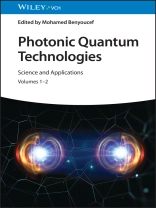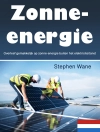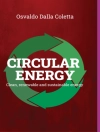Photonic Quantum Technologies
Brings together top-level research results to enable the development of practical quantum devices
In Photonic Quantum Technologies: Science and Applications, the editor Mohamed Benyoucef and a team of distinguished scientists from different disciplines deliver an authoritative, one-stop overview of up-to-date research on various quantum systems. This unique book reviews the state-of-the-art research in photonic quantum technologies and bridges the fundamentals of the field with applications to provide readers from academia and industry, in one-location resource, with cutting-edge knowledge they need to have to understand and develop practical quantum systems for application in e.g., secure quantum communication, quantum metrology, and quantum computing. The book also addresses fundamental and engineering challenges en route to workable quantum devices and ways to circumvent or overcome them.
Readers will also find:
- A thorough introduction to the fundamentals of quantum technologies, including discussions of the second quantum revolution (by Nobel Laureate Alain Aspect), solid-state quantum optics, and non-classical light and quantum entanglement
- Comprehensive explorations of emerging quantum technologies and their practical applications, including quantum repeaters, satellite-based quantum communication, quantum networks, silicon quantum photonics, integrated quantum systems, and future vision
- Practical discussions of quantum technologies with artificial atoms, color centers, 2D materials, molecules, atoms, ions, and optical clocks
Perfect for molecular and solid-state physicists, Photonic Quantum Technologies: Science and Applications will also benefit industrial and academic researchers in photonics and quantum optics, graduate students in the field; engineers, chemists, and computer and material scientists.
Daftar Isi
Introduction to Quantum Photonics
PART I: FUNDAMENTALS OF QUANTUM TECHNOLOGIES
The second quantum revolution: from basic concepts to quantum technologies
Solid state quantum emitters
Single photon sources for multi-photon applications
Quantum Key Distribution Protocols
From basic science to technological development: the case for two avenues
Quantum Networks in Space
PART II: ATOMS, IONS, AND MOLECULES: FROM EXPERIMENTAL TECHNIQUES TO RECENT PROGRESS
Fluorescence spectroscopy in planar dielectric and metallic systems
Single Trapped Neutral Atoms in Optical Lattices
Long Distance Entanglement of Atomic Qubits
Collective Light emission of ion crystals in correlated Dicke states
Single Molecule Magnets Spin Devices
Molecular-ion quantum technologies
Optical atomic clocks
PART III: SPIN QUBITS AND QUANTUM MEMORIES: FROM SPIN PROPERTIES TO PHYSICAL REALIZATIONS
Coherent Spin Dynamics of Colloidal Nanocrystals
Relaxation of Electron and Hole Spin Qubits in III-V Quantum Dots
Ensemble-Based Quantum Memory: Principle, Advance, and Application
PART IV: SOLID-STATE AND VAN DER WAALS MATERIAL PLATFORMS: FROM SINGLE QUANTUM EMITTERS TO HYBRID INTEGRATION
Telecom wavelengths In P-based quantum dots for quantum communication
Quantum Optics with Solid-State Colour Centres
Quantum photonics with 2D semiconductors
Nano-opto-electro-mechanical systems for integrated quantum photonics
Silicon Quantum Photonics Platform
PART V: EMERGING QUANTUM TECHNOLOGIES: CHALLENGES AND POTENTIAL APPLICATIONS
Photonic realization of qubit quantum computing
Fiber-Based Quantum Repeaters
Long-distance satellite-based quantum communication
Quantum Communication Networks for 6G
Tentang Penulis
Mohamed Benyoucef is a Professor of Physics at the University of Kassel. He received his Ph D degree from the University of Bristol (United Kingdom), and his habilitation from the University of Kassel (Germany). His research focuses on quantum dots, quantum optics and nanophononics, including the development of novel and advanced quantum nanoarchitectures; the integration of III-V semiconductor light sources into silicon, fabrication, and characterization of nano-/micro-cavities in combination with integrated quantum emitters; the study of molecule complexes and their integration into solid-state platforms as hybrid quantum systems for quantum technology applications.












